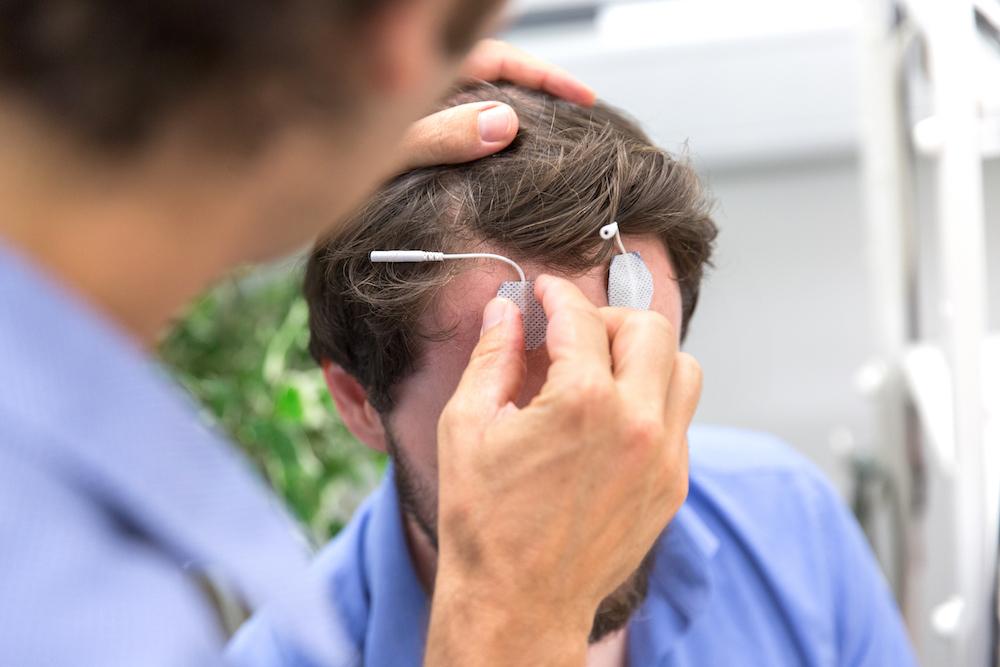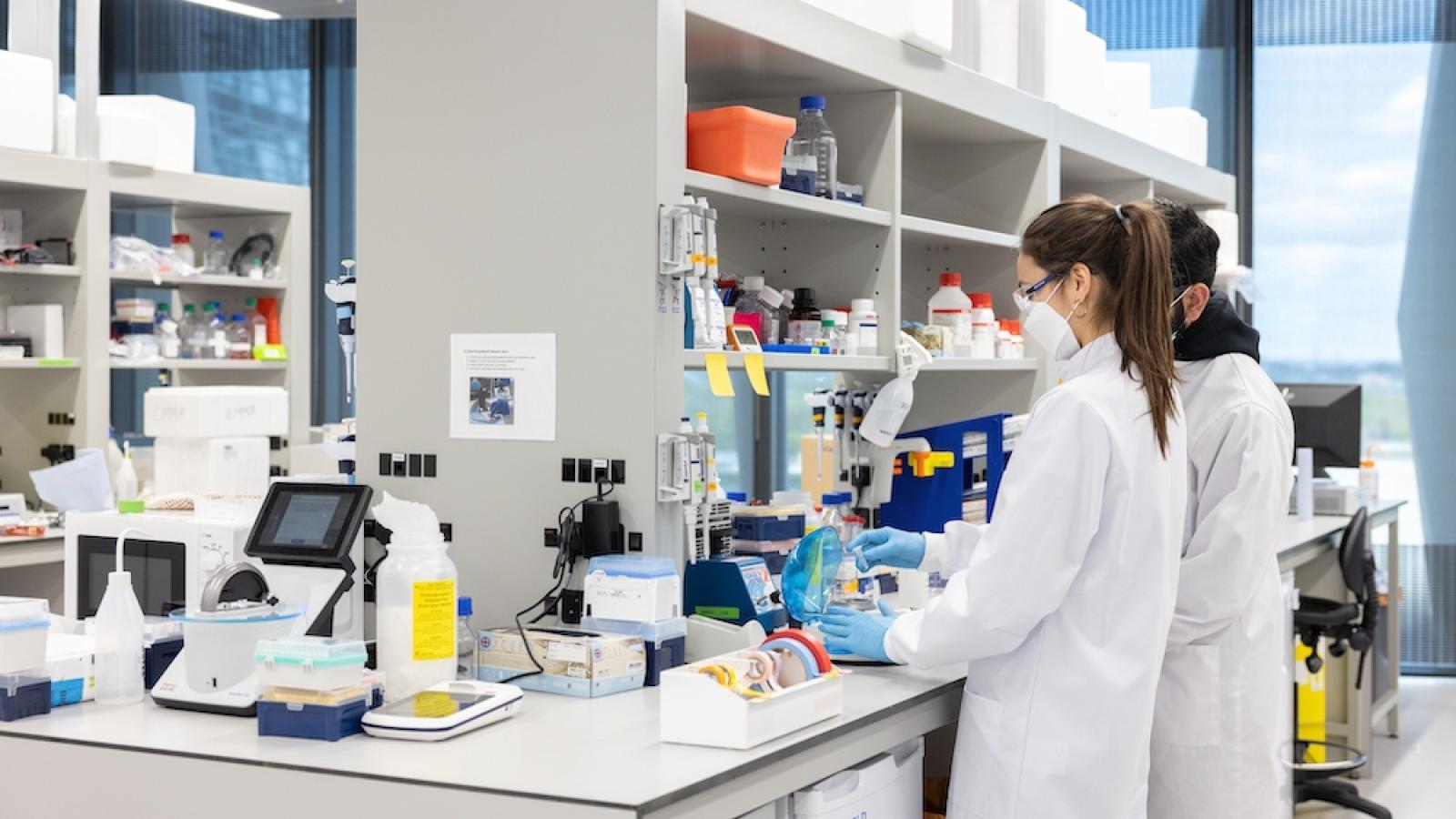Launched in March 2021, the UK DRI Translation Award programme was established to kick start the early development of projects with high translational potential, bringing us closer to new technologies and treatments for dementia. We caught up with a selection of the successful past recipients to discover the impact these awards have had on their research.
Optimisation of CRISPR-Cas9 technology for delivery and gene editing in animal models of diseases such as Huntington’s
Prof Vincent Dion (UK DRI at Cardiff)
Working in collaboration with Dr Georgina Menzies and Dr Mariah Lelos (Cardiff University) and Prof Annalisa Pastore (Former Group Leader, UK DRI at King’s), Prof Dion has set out to develop new variants of CRISPR-Cas9 technology, with the aim of improving delivery and target efficiency in cellular and animal models of Huntington’s.
“Using molecular dynamics, we have been able to design new Cas9 variants which we hope will improve efficiency of delivering Cas9 to the brain using viral vectors. The translational award is very important in bridging pre-clinical and clinical work. It's helped us address questions about delivery of a gene editing agent and push our research towards the clinic. This is much needed for a wide array of disorders, including Huntington's disease.”
We hear about the progress made in four of our successful translation projects
A high-throughput small molecule screen to correct TDP-43 induced stathmin-2 cryptic splicing in ALS and FTD
Prof Adrian Isaacs (UK DRI at UCL)
Partnering with the Alzheimer’s Research UK’s (ARUK) Drug Discovery Alliance - UCL Drug Discovery Institute (ARUK DDI), Prof Isaacs’ team are performing a large-scale drug screening campaign of 176,000 compounds to identify small molecules that restore neuronal health in ALS/FTD.
“We’ve developed a highly robust assay and have now successfully screened 125,000 compounds. We have several hits to take forward which is very exciting! This would not have been possible without funding from the UK DRI translation scheme and crucially our very close collaboration with the DDI, which has transformed our ability to perform meaningful drug discovery. We look forward to working together on the next steps of the project.”
Identification of novel, brain-penetrant inhibitors of the C3bBb convertase for treatment of neurodegenerative diseases
Prof Paul Morgan (UK DRI at Cardiff)
In this project led by Prof Paul Morgan, complement biology experts from the UK DRI at Cardiff have joined with ARUK Drug Discovery Alliance - Oxford Drug Discovery Institute (ARUK DDI) to identify inhibitors of the alternative complement pathway that, crucially, penetrate into the central nervous system, and have the potential to target harmful neuroflammation associated with neurodegenerative disease.
“We’ve now developed the high-throughput screening methodology and the first compound screens are planned in the next month. I am confident that we will obtain hits from this screen that we can further evolve towards future drugs. Collaboration with Oxford DDI has been essential for this project – although we know the complement system very well and can develop unique assays, we neither have the capacity to run at scale nor access to relevant compound libraries. They help fill these gaps.”
Non-invasive brain stimulation intervention to ameliorate pathogenic sleep-arousal impairment in dementia
Dr Nir Grossman (UK DRI at Imperial)
In collaboration with Prof Derk-Jan Dijk and Dr Ines Violante (UK DRI Care Research and Technology, based at the University of Surrey), Dr Grossman and his team are working to develop a non-pharmacological intervention for sleep disturbances in dementia, based on a novel sensory stimulation that augments brain activity.
“The translational award has been helping us to further improve our interventional concept and expand the evidence of sleep features augmentation. The outcome will guide the next, larger scale investigation and strengthen our ability to fund it.

Non-invasive brain stimulation technology from the Grossman Lab (UK DRI at Imperial)
This year’s translation award has an extended budget, thanks to dedicated funds from ARUK and the Medical Research Council Impact Acceleration Account (MRC IAA). The awards are extremely versatile, aimed at combating the funding gap between basic science and translational science to help drive the next development stages. Examples include support for:
- Attracting external investment and/or secure larger scale schemes.
- Researchers with early pre-clinical work to test the technical and economic feasibility of commercialising their research.
- Enabling projects that have previously demonstrated translation success to strengthen their proof-of-concept data.
To find out more about the UK DRI's approach to translation and innovation, partnerships we've made in this area and how we stimulate new projects that have the potential to transform lives through new treatments, see 'Translation and Innovation'. Additionally, sign up to our quarterly newsletter curated by the Business & Innovation team at UK DRI HQ.
Article published: 04 October 2022
Banner image: Shutterstock/Meletios Verras / Shutterstock.com
Banner and Grossman images: Thomas Angus / Imperial College London
